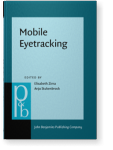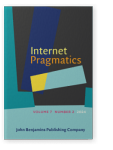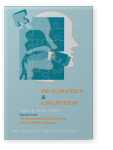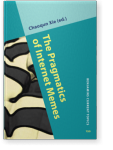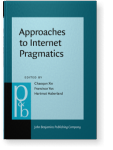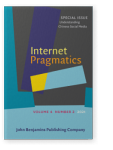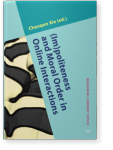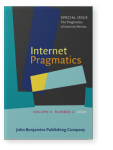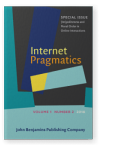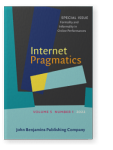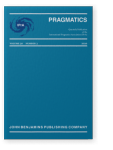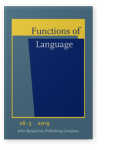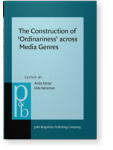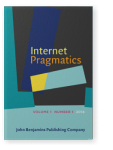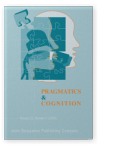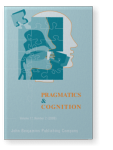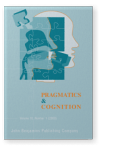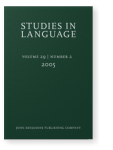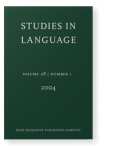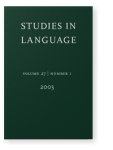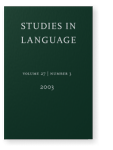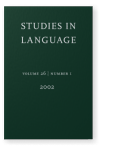Chaoqun Xie
List of John Benjamins publications for which Chaoqun Xie plays a role.
Book series
Journals
ISSN 0929-0907 | E-ISSN 1569-9943
The Pragmatics of Internet Memes
Edited by Chaoqun Xie
[Benjamins Current Topics, 120] 2022. v, 183 pp.
Subjects Discourse studies | Pragmatics
Approaches to Internet Pragmatics: Theory and practice
Edited by Chaoqun Xie, Francisco Yus and Hartmut Haberland
[Pragmatics & Beyond New Series, 318] 2021. vii, 348 pp.
Subjects Communication Studies | Discourse studies | Pragmatics | Sociolinguistics and Dialectology
Understanding Chinese Social Media
Edited by Sumin Zhao and Chaoqun Xie
Special issue of Internet Pragmatics 4:2 (2021) v, 146 pp.
Subjects Communication Studies | Discourse studies | Pragmatics
(Im)politeness and Moral Order in Online Interactions
Edited by Chaoqun Xie
[Benjamins Current Topics, 107] 2020. v, 177 pp.
Subjects Discourse studies | Pragmatics
The Pragmatics of Internet Memes
Edited by Chaoqun Xie
Special issue of Internet Pragmatics 3:2 (2020) v, 193 pp.
Subjects Communication Studies | Discourse studies | Pragmatics
(Im)politeness and Moral Order in Online Interactions
Edited by Chaoqun Xie
Special issue of Internet Pragmatics 1:2 (2018) v, 174 pp.
Subjects Communication Studies | Discourse studies | Pragmatics
2023 “A tour guide losing her cool”: Emotional stance and social positioning in doing moral work Pragmatics and Society 14:5, pp. 732–752 | Article
This article seeks to explore the mechanisms of holding others accountable for a perceived deviation from moral order through public complaints on Chinese social media as well as the influences of emotional stance and social positioning when people perceive a breach of the moral order and try to… read more
2022 Complaining, teasing, and meme-framing: Socializing through Moments storytelling Formality and Informality in Online Performances, Rüdiger, Sofia and Susanne Mühleisen (eds.), pp. 66–91 | Article
This article explores the pragmatic act of complaining on WeChat Moments (henceforth Moments) focusing on the following question: When complaints are made in a social context where ratified viewers are hard to define, how are such acts constructed and construed? The multimodal data under study… read more
2022 Introduction: The pragmatics of internet memes The Pragmatics of Internet Memes, Xie, Chaoqun (ed.), pp. 1–6 | Chapter
2022 Internet memes we live by (and die by) The Pragmatics of Internet Memes, Xie, Chaoqun (ed.), pp. 7–35 | Chapter
In the internet age, memes are at once products and driving forces of social practices. A meme contains a memetic message and a meme output, and boasts, if guided by a pragmatic way of thinking, several features, including, but not limited to, salience, frequency, adaptability, argumentativity,… read more
2021 Introduction: Understanding Chinese social media Understanding Chinese Social Media, Zhao, Sumin and Chaoqun Xie (eds.), pp. 177–189 | Introduction
Human beings are now living in social media, for various social media apps or platforms are becoming more and more indispensable to their everyday livelihood and social practice. In fact, social media users are dwelling in two life-worlds and living two lives, online and offline, shuttling back… read more
2021 Chapter 7. Inviting a purchase: A multimodal analysis of staged authenticity in WeChat social selling Approaches to Internet Pragmatics: Theory and practice, Xie, Chaoqun, Francisco Yus and Hartmut Haberland (eds.), pp. 207–234 | Chapter
The present study investigates the pragmatic strategies and effects of self-presentation performance in a social selling context either by way of status updates or through group chat in WeChat, a popular social networking platform in China. Drawing on Goffman’s (1959, 1974, 1981) outstanding… read more
2021 Introduction: Approaching internet pragmatics Approaches to Internet Pragmatics: Theory and practice, Xie, Chaoqun, Francisco Yus and Hartmut Haberland (eds.), pp. 1–23 | Introduction
2020 Internet memes we live by (and die by) The Pragmatics of Internet Memes, Xie, Chaoqun (ed.), pp. 145–173 | Article
In the internet age, memes are at once products and driving forces of social practices. A meme contains a memetic message and a meme output, and boasts, if guided by a pragmatic way of thinking, several features, including but not limited to salience, frequency, adaptability, argumentativity,… read more
2020 The pragmatics of internet memes The Pragmatics of Internet Memes, Xie, Chaoqun (ed.), pp. 139–144 | Introduction
2020 (Im)politeness, morality and the internet (Im)politeness and Moral Order in Online Interactions, Xie, Chaoqun (ed.), pp. 1–10 | Chapter
Much recent research has contributed to the emergence of a moral turn in (im)politeness scholarship, further confirming the evaluative nature of (im)politeness and the moral basis of (im)politeness evaluations, and further illuminating, among other things, what is really at work when (im)politeness… read more
2020 Bonding across Chinese social media: The pragmatics of language play in “精 (sang) 彩 (xin) 有 (bing) 趣 (kuang)” construction Pragmatics 30:3, pp. 431–457 | Article
This paper explores social bonding in language play via the construction of ‘Chinese character (annotation)’ on two major social media platforms (Sina Weibo and WeChat) in China. The Chinese characters and their bracketed annotations under study, despite their one-to-one matching in sequence,… read more
2019 Constructing ‘ordinariness’: An analysis of Jack Ma’s narrative identities on Sina Weibo The Construction of ‘Ordinariness’ across Media Genres, Fetzer, Anita and Elda Weizman (eds.), pp. 179–205 | Chapter
In this chapter, we attempt, inspired by Sacks’ (1984) discussion of “doing being ordinary”, to explore and expound the means and purposes celebrities do “being ordinary” on social media and the related notions of narrative in digital communication and narrative identity. These notions are… read more
2018 (Im)politeness, morality and the internet (Im)politeness and Moral Order in Online Interactions, Xie, Chaoqun (ed.), pp. 205–215 | Introduction
Much recent research has contributed to the emergence of a moral turn in (im)politeness research, further confirming the evaluative nature of (im)politeness and the moral basis of (im)politeness evaluations, and further illuminating, among other things, what is really at work when (im)politeness… read more
2018 Introducing internet pragmatics Internet Pragmatics 1:1, pp. 1–12 | Article
The internet and internet-mediated life have presented new issues and challenges for research on pragmatics. When analyzing the application of pragmatics to internet-mediated communication, a possibility is to set up a number of layers and study the contributions that traditional pragmatic… read more
2017 McCready, Eric. 2015. Reliability in Pragmatics Studies in Language 41:3, pp. 800–807 | Review
2014 The cognitive pragmatics of subtitling Pragmatics & Cognition 22:3, pp. 402–420 | Review article
This paper features a critical review of the book Politeness and Audience Response in Chinese-English Subtitling. A brief introduction of the book’s content is given first, followed by a critical appraisal on merits and loopholes in the book. Furthermore, some interdisciplinary amendments — based… read more
2009 Some aspects of pragmatics: Linguistic, cognitive, and intercultural Pragmatics & Cognition 17:2, pp. 421–439 | Article
Part of current pragmatics research aims at opening up new avenues of inquiry by revisiting and revising some of its central topics and keywords, such as implicature, explicature, truth, varieties of meaning, meaning inference, relevance, politeness, and face. This review article attempts to… read more
2008 (Im)politeness: Towards an evaluative and embodied approach Pragmatics & Cognition 16:1, pp. 151–175 | Article
2007 Controversies about politeness Traditions of Controversy, Dascal, Marcelo † and Han-liang Chang (eds.), pp. 249–266 | Article
2005 Politeness: Myth and truth Studies in Language 29:2, pp. 431–461 | Article
Little progress has been made in modern politeness studies despite mountains of publications that have been bombarding the politeness market over the past three or so decades, rendering the latter in much a mess. It is argued in this paper that (1) politeness does not necessarily entail sincerity,… read more
2004 Review of Kasher (1998): Pragmatics: Critical Concepts Studies in Language 28:1, pp. 237–246 | Review
2003 Review of Noh (2000): Metarepresentation. A Relevance-theory Approach Studies in Language 27:1, pp. 171–179 | Review
2002 Review of Cooren (1999): The Organizing Property of Communication Studies in Language 26:1, pp. 181–188 | Review

